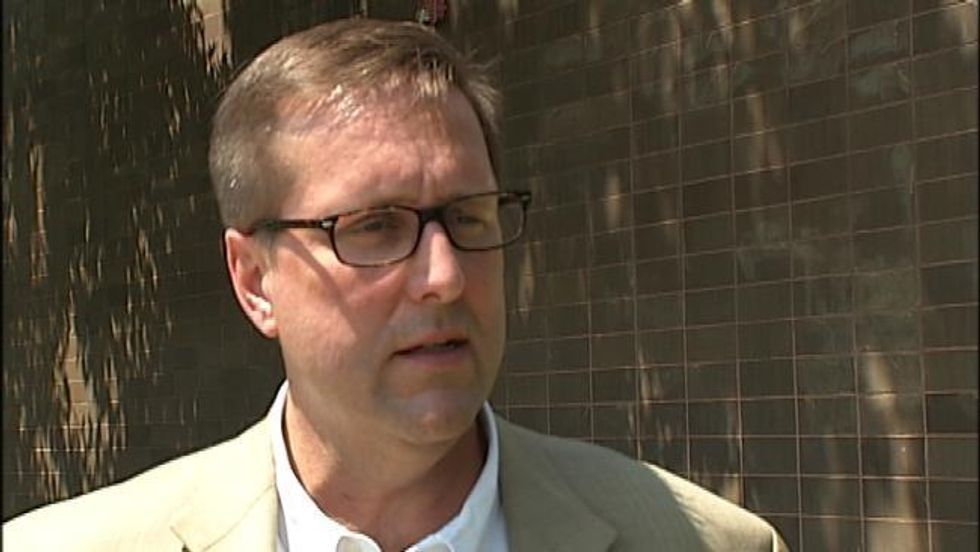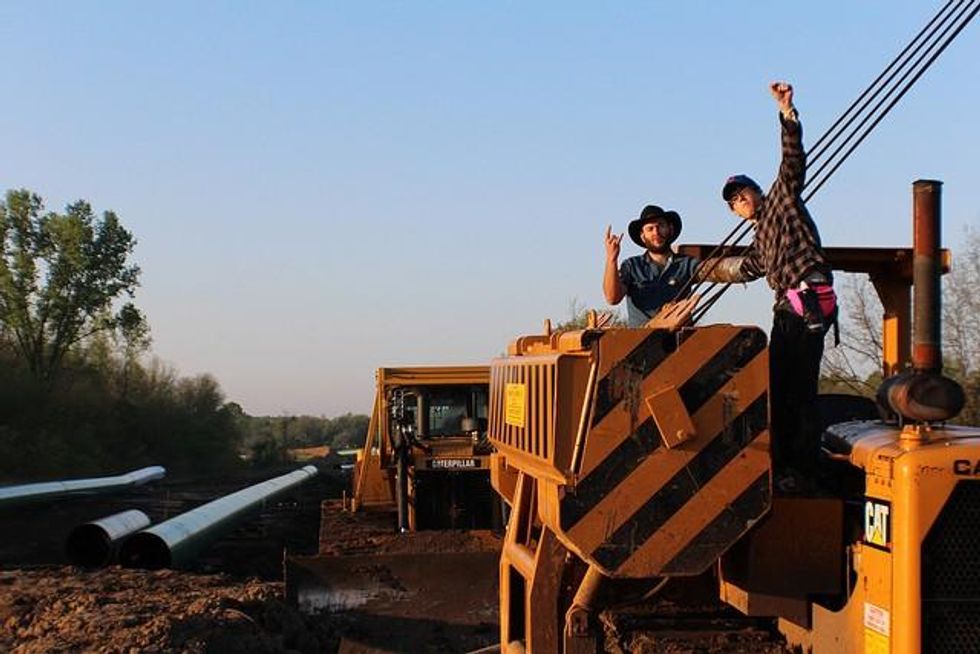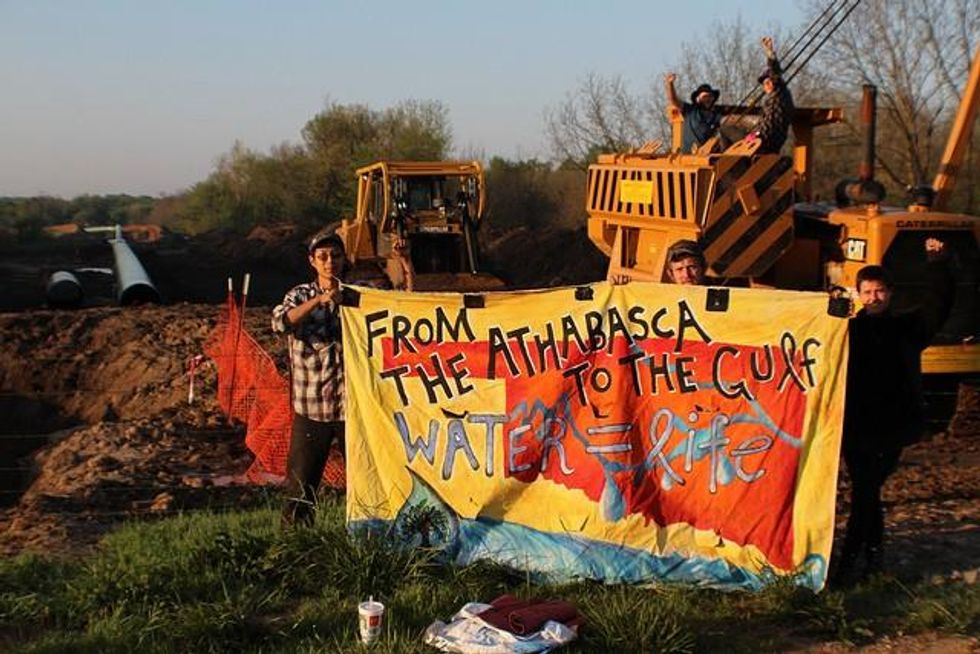TransCanada: Small-Scale Protests Against KXL Not Slowing 'Overall Construction Progress'
Two arrested after latest tar sands pipeline blockade in Oklahoma

"Like the others that came before it, today's protest did not interfere with overall construction progress," said Jim Prescott, a spokesman for the company behind the pipeline, Transcanada. "As of today, construction of the 485-mile Gulf Coast Pipeline is more than 70 percent complete and on schedule to begin operation by the end of 2013."
"Like the others that came before it, today's protest did not interfere with overall construction progress." -Jim Prescott, TransCanada
The men in today's action, Benjamin Butler and Eamon Treadaway Danzig, locked themselves to the roof of a construction vehicle at a contruction site near Spauling, Oklahoma and police could not remove them, organizers with the Great Plains Tar Sands Resistance said, until firefighters cut apart the lock box attaching them to a side boom. They were immediately arrested.
Construction of the southern portion of the controversial tar sands pipeline, known as The Gulf Coast Project, runs from Cushing, Oklahoma to refineries on the Texas coast. The northern leg, which is awaiting final approval from President Obama and his State Department, would begin in Alberta, Canada and connect to the new hub being built in Cushing.
"This pipeline is essential for continued tar sands exploitation, which poses an imminent threat to the health of indigenous communities near the point of extraction, fence-line communities around the toxic refineries, and ultimately the health of every living being along the route," said Butler in a statement. "I believe in a more beautiful world, one where the profits of a corporation don't outweigh the health of the people and the planet."
"I believe in a more beautiful world, one where the profits of a corporation don't outweigh the health of the people and the planet." -Benjamin Butler
In recent weeks, several similar protests have been staged against the construction in Oklahoma and resistance has also been growing in Nebraska, where a public hearing earlier this month saw community members from all over the region speak passionately against the project.
As the Great Plains Tar Sands Resistance said in a statement on Monday:
The Tar Sands megaproject is the largest industrial project in the history of humankind, destroying an area of pristine boreal forest which, if fully realized, will leave behind a toxic wasteland the size of Florida. The Tar Sands megaproject continues to endanger the health and way of life of the First Nations communities that live nearby by poisoning the waterways which life in the area depends on. This pipeline promises to deliver toxic diluted bitumen to the noxious Valero Refinery at the front door of the fence-line community of Manchester in Houston.
Currently, there is staunch resistance to the expansion of Tar Sands infrastructure--Lakota and Dakota peoples in "South Dakota" have sworn to protect their land and people from the Keystone XL, lifelong Oklahomans and Texans are consistently halting construction of the inherently dangerous Keystone XL, and the Unis'tot'en Camp has entered the third year of their blockade of the Pacific Trails Pipeline.
Protest images (via Great Plains Tar Sands Resistance):


___________________________________________
An Urgent Message From Our Co-Founder
Dear Common Dreams reader, The U.S. is on a fast track to authoritarianism like nothing I've ever seen. Meanwhile, corporate news outlets are utterly capitulating to Trump, twisting their coverage to avoid drawing his ire while lining up to stuff cash in his pockets. That's why I believe that Common Dreams is doing the best and most consequential reporting that we've ever done. Our small but mighty team is a progressive reporting powerhouse, covering the news every day that the corporate media never will. Our mission has always been simple: To inform. To inspire. And to ignite change for the common good. Now here's the key piece that I want all our readers to understand: None of this would be possible without your financial support. That's not just some fundraising cliche. It's the absolute and literal truth. We don't accept corporate advertising and never will. We don't have a paywall because we don't think people should be blocked from critical news based on their ability to pay. Everything we do is funded by the donations of readers like you. Will you donate now to help power the nonprofit, independent reporting of Common Dreams? Thank you for being a vital member of our community. Together, we can keep independent journalism alive when it’s needed most. - Craig Brown, Co-founder |

"Like the others that came before it, today's protest did not interfere with overall construction progress," said Jim Prescott, a spokesman for the company behind the pipeline, Transcanada. "As of today, construction of the 485-mile Gulf Coast Pipeline is more than 70 percent complete and on schedule to begin operation by the end of 2013."
"Like the others that came before it, today's protest did not interfere with overall construction progress." -Jim Prescott, TransCanada
The men in today's action, Benjamin Butler and Eamon Treadaway Danzig, locked themselves to the roof of a construction vehicle at a contruction site near Spauling, Oklahoma and police could not remove them, organizers with the Great Plains Tar Sands Resistance said, until firefighters cut apart the lock box attaching them to a side boom. They were immediately arrested.
Construction of the southern portion of the controversial tar sands pipeline, known as The Gulf Coast Project, runs from Cushing, Oklahoma to refineries on the Texas coast. The northern leg, which is awaiting final approval from President Obama and his State Department, would begin in Alberta, Canada and connect to the new hub being built in Cushing.
"This pipeline is essential for continued tar sands exploitation, which poses an imminent threat to the health of indigenous communities near the point of extraction, fence-line communities around the toxic refineries, and ultimately the health of every living being along the route," said Butler in a statement. "I believe in a more beautiful world, one where the profits of a corporation don't outweigh the health of the people and the planet."
"I believe in a more beautiful world, one where the profits of a corporation don't outweigh the health of the people and the planet." -Benjamin Butler
In recent weeks, several similar protests have been staged against the construction in Oklahoma and resistance has also been growing in Nebraska, where a public hearing earlier this month saw community members from all over the region speak passionately against the project.
As the Great Plains Tar Sands Resistance said in a statement on Monday:
The Tar Sands megaproject is the largest industrial project in the history of humankind, destroying an area of pristine boreal forest which, if fully realized, will leave behind a toxic wasteland the size of Florida. The Tar Sands megaproject continues to endanger the health and way of life of the First Nations communities that live nearby by poisoning the waterways which life in the area depends on. This pipeline promises to deliver toxic diluted bitumen to the noxious Valero Refinery at the front door of the fence-line community of Manchester in Houston.
Currently, there is staunch resistance to the expansion of Tar Sands infrastructure--Lakota and Dakota peoples in "South Dakota" have sworn to protect their land and people from the Keystone XL, lifelong Oklahomans and Texans are consistently halting construction of the inherently dangerous Keystone XL, and the Unis'tot'en Camp has entered the third year of their blockade of the Pacific Trails Pipeline.
Protest images (via Great Plains Tar Sands Resistance):


___________________________________________

"Like the others that came before it, today's protest did not interfere with overall construction progress," said Jim Prescott, a spokesman for the company behind the pipeline, Transcanada. "As of today, construction of the 485-mile Gulf Coast Pipeline is more than 70 percent complete and on schedule to begin operation by the end of 2013."
"Like the others that came before it, today's protest did not interfere with overall construction progress." -Jim Prescott, TransCanada
The men in today's action, Benjamin Butler and Eamon Treadaway Danzig, locked themselves to the roof of a construction vehicle at a contruction site near Spauling, Oklahoma and police could not remove them, organizers with the Great Plains Tar Sands Resistance said, until firefighters cut apart the lock box attaching them to a side boom. They were immediately arrested.
Construction of the southern portion of the controversial tar sands pipeline, known as The Gulf Coast Project, runs from Cushing, Oklahoma to refineries on the Texas coast. The northern leg, which is awaiting final approval from President Obama and his State Department, would begin in Alberta, Canada and connect to the new hub being built in Cushing.
"This pipeline is essential for continued tar sands exploitation, which poses an imminent threat to the health of indigenous communities near the point of extraction, fence-line communities around the toxic refineries, and ultimately the health of every living being along the route," said Butler in a statement. "I believe in a more beautiful world, one where the profits of a corporation don't outweigh the health of the people and the planet."
"I believe in a more beautiful world, one where the profits of a corporation don't outweigh the health of the people and the planet." -Benjamin Butler
In recent weeks, several similar protests have been staged against the construction in Oklahoma and resistance has also been growing in Nebraska, where a public hearing earlier this month saw community members from all over the region speak passionately against the project.
As the Great Plains Tar Sands Resistance said in a statement on Monday:
The Tar Sands megaproject is the largest industrial project in the history of humankind, destroying an area of pristine boreal forest which, if fully realized, will leave behind a toxic wasteland the size of Florida. The Tar Sands megaproject continues to endanger the health and way of life of the First Nations communities that live nearby by poisoning the waterways which life in the area depends on. This pipeline promises to deliver toxic diluted bitumen to the noxious Valero Refinery at the front door of the fence-line community of Manchester in Houston.
Currently, there is staunch resistance to the expansion of Tar Sands infrastructure--Lakota and Dakota peoples in "South Dakota" have sworn to protect their land and people from the Keystone XL, lifelong Oklahomans and Texans are consistently halting construction of the inherently dangerous Keystone XL, and the Unis'tot'en Camp has entered the third year of their blockade of the Pacific Trails Pipeline.
Protest images (via Great Plains Tar Sands Resistance):


___________________________________________

